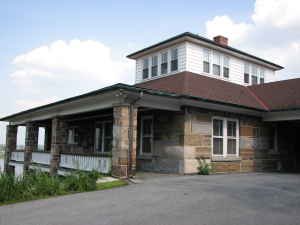September 1, 2009
Tuesday
Suzanne takes you down to her place near the river.
You can hear the boats go by, you can spend the night beside her
And you know that she’s half crazy . . .
                      — Leonard Cohen, b. 1934
                          Canadian poet, singer, and songwriter
From the time I was seven until I was sixteen, I lived in half a double house on Fifth Street in Harrisburg. It was a small world, four city blocks square, bordered on the north by the Emerald Street playground and on the south by Our Lady of the Blessed Sacrament School. To the east were the railroad tracks, and to the west, two blocks down the hill, was Our Lady of the Blessed Sacrament church, its bell tower rising above the trees and sounding the Angelus at noon each day. Beyond the church was the Susquehanna River, and when I was a little older I was allowed to walk that far, but no farther. I sat on a bench there the summer I turned fourteen and read Anna Karenina and Desiree. A few years later it was Kristin Lavransdatter and The Nun’s Story.
My sister and I shared a bedroom, a dark space with a single window that looked out on the narrow walkway between our house and Sullivans’. My parents had “the front room,” and my grandmother had the large, airy room at the back, that also had a small sitting room and an enclosed porch. We had an unheated attic that held odds and ends of unused furniture and a wardrobe for out-of-season clothing. After I read Little Women, I wanted to be Jo March. I pushed a small table and chair into an alcove in the attic and set up a writing space there. After my grandmother died I got her room and a full-size student desk for the sitting room.
The sitting room, the enclosed porch, and the alcove in the attic all looked out over the treetops and the rooftops that swept down the steep hill between our house and the river. In the late afternoon I could see the water shimmering like a narrow ribbon across the horizon. After dark I sometimes went out on the enclosed porch and unlatched the big windows that opened like doors. “Letting in the sounds of the night,” I called it — train whistles and city traffic, barking dogs and the occasional voices raised in anger or despair among people who lived close together and close to the edge.
I was a dreamy, imaginative child who made a poem or a story of every sound and every image. I longed for a wider world, a space apart from a family that seemed often not to understand me, whose love was expressed most often in overprotectiveness and control. From those big windows on the porch I could see a house directly across the mile-wide water. Surrounded by trees and set into a hillside, its most prominent feature was a row of windows in what appeared to be an aerie-like structure on the top floor of a castle. I fantasized about the house, imagining myself sailing across the water and taking up residence there.
At the beginning of July I found myself, along with a writer friend, seeking low-cost studio space. For years we had talked about securing such a place, a room of our own that we could share, a place to write apart from the distractions of home and family, a place where we could gather with other writers for workshop groups, where my friend could offer her well-planned courses in revision and novel structure. “Half a double in Enola,” we sometimes said, referring to a small settlement full of neighborhoods not unlike the one I grew up in that had once housed primarily the men who worked the freight yards and their families.
For two years we’d had irregular access to an apartment maintained by someone who spent long periods elsewhere. That arrangement was coming to an end, and it would be necessary to clear out the few things that were ours and either find new space or store or sell the items. For two weeks I looked at small apartments in various states of shabbiness. Our budget was tight, our need immediate, since this had to be accomplished before both of us went on our August gallivants.
I saw one place that was described as “in the flood plane.” Actually, it was below sea level, in the basement of a building that offered a “view of the river” through a tiny window in the bathroom. The refrigerator door in that one didn’t open all the way, bumping into the stove opposite. I saw another that reeked of cigarettes out on the lawn, the stench becoming so overpowering that I never did enter the apartment itself. Another had a bedroom so small that even a twin-size bed would have to be wedged in crosswise, and if you weren’t already ensconced in it, you’d have to climb over it to access the bathroom (or, in the alternative, if you didn’t want to disturb a sleeping partner, go out the front door and walk around the building to the back door and come through the kitchen).
That place actually was in Enola, half of half of a double. The owner, a personable, attractive young man barely in his forties, showed me yet another place, even less charming than the first, their only interesting aspect their cost in the upper end of our funding limit. I sighed. I had two weeks to get this done. I told him I’d think about it.
I’d told him what my interest was — that my friend and I didn’t want to live there, just use it as a writing space, a room of our own, a pied-Ã -terre. And I’d emphasized the absolute limitations of our budget. “Let me show you a very special space,” he said. “It’s easier if I drive you there.”
I climbed into his Jeep Wrangler, its soft top rolled back and the windows folded down, and suddenly I felt like I was in a Bruce Springsteen song, riding through mansions of glory in a suicide machine. We rattled off down a narrow street and then turned up a steep hill. At the top I turned my head to the right, toward where I knew the house I had fantasized about for fifty years stood. I glimpsed the aerie-like structure, and then turned away, expecting that we were headed in the opposite direction to the row of trailers and small structures I’d seen from below.
Instead, he turned right and before he got to the top of the driveway I said, “I’ll take it.” “You haven’t even seen it yet. Your friend hasn’t seen it.” “I don’t care,” I said. I was already digging into my purse for my checkbook.

At left you see what the owner calls “the Penthouse” but which I will always call “the Aerie.” It’s the square space at the top, a single room like a New York loft with 360-degree views of the city, the uptown area where I once lived, the suburbs to the north where I now live and the mountains beyond and, to the west, a broad lawn and flower beds that, on that first day, were ablaze with orange tiger lilies. The house was once the 7000-square foot summer home of an upriver coal baron. It’s now six large luxury apartments (two on the floor you can see under the Aerie, two each on two more floors underneath). Designed by an associate of Frank Lloyd Wright and built in the 1920s, it nestles into a hillside a hundred feet above the river.
 The owner rents it out only when he has a special tenant who can appreciate this special space. Part of its “specialness” lies in the fact that it doesn’t have central air conditioning like the rest of the house, it doesn’t have a real kitchen, only a refrigerator and a microwave such as one gets for a dorm room, and the bathtub, seen at right, is in the living room area.
The owner rents it out only when he has a special tenant who can appreciate this special space. Part of its “specialness” lies in the fact that it doesn’t have central air conditioning like the rest of the house, it doesn’t have a real kitchen, only a refrigerator and a microwave such as one gets for a dorm room, and the bathtub, seen at right, is in the living room area.
We have committed to this space for at least a year and drawn up a schedule for shared access. I’m ready for a Year of Writing Seriously in my place near the river. I’m back from Bread Loaf renewed and restored, with a clearer sense of who I am as a writer and a person. I spent yesterday organizing my novel materials, untouched since June. And I wrote 500 new words today. Both days I heard the church of my childhood ring the Angelus.
If you’re in the area, come by. I will feed you tea and oranges that come all the way from China.
Love it? Hate it? Just want to say hi?
To comment or to be included on the notify list, e-mail me:
margaretdeangelis [at] gmail [dot] com (replace the bracketed parts with @ and a period) OR
Follow me on Twitter: http://twitter.com/silkentent